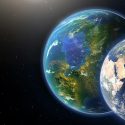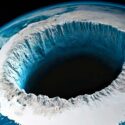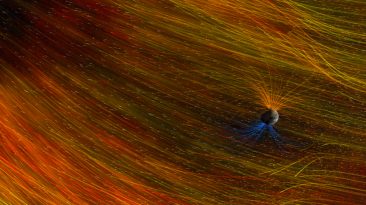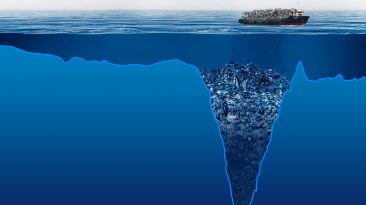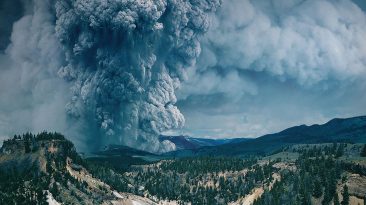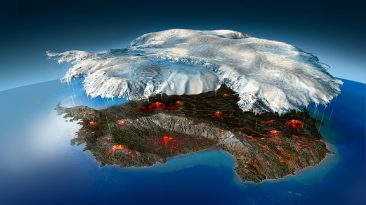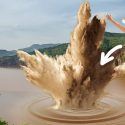Hang on because we’re about to screech to a halt. That’s right. The Earth is going to stop spinning for five seconds. How much damage would this sudden stoppage cause? What would you experience in different parts of the world? And when the Earth starts spinning again, would it still be habitable?
The Earth makes one full rotation on its axis in one day. This gives us day and night. The Earth is spinning because of collisions that happened when the planet was forming 4.6 billion years ago. As a huge disk of gas and dust swirled around the Sun, dust and rock grains clumped together, generating forces that kept the planet rotating in one direction.
You could imagine it much like a figure skater spinning faster and faster. And with almost no forces in space to slow the planet down, we keep rotating. And will continue to for billions of years. But if the Earth stopped on a dime, would you fly right off the surface?
If the planet came to an abrupt halt, the atmosphere would still be in motion. That means though everything has lurched to a stop, powerful winds would continue to blow. And these wouldn’t be a strong breeze. They would be many times stronger than any storm you’ve ever encountered.
But the strength of these winds would differ based on where you were on the planet. At or near the equator, the Earth is rotating at its fastest. Here you’d experience wind speeds of 1,670 km/h (1,037 mph). Those winds would knock you off your feet.
But forget about you. They would be strong enough to tear up the Earth’s crust. So it wouldn’t matter if you were out in an open field or inside a steel-reinforced building. These winds would obliterate you.
For context, the strongest F5 tornadoes have velocities up to 511 km/h (318 mph). These storms can move houses off their foundations, send cars flying and even tear apart concrete structures. The winds from Earth’s emergency brake would be three times stronger than that. So if the crust under your feet didn’t crumble, you and a lot of other stuff would likely go flying a great distance. But not off the face of the Earth.
The escape velocity, or the speed you need to escape the Earth’s gravitational forces and enter space, is about 40,000 km/h (25,000 mph). In other parts of the world, like New Zealand or France, you’d experience slightly weaker winds. But at 1,180 km/h (733 mph), these would still be much stronger than any storm ever.
These winds would pretty much destroy everything. But they wouldn’t be the only hazard you’d need to keep an eye out for in these short five seconds. Our planet is not a perfect sphere. It bulges near the equator due to the centrifugal forces generated by the planet’s rotation. If the rotation stopped, the Earth would transform quickly into a perfect sphere.
All the water gathering near the equator would flow away toward the poles, generating a massive tsunami. Five seconds later, when the planet returned to its full-speed rotation, that water would backtrack. A wall of water would slam into everything and everyone. Twice. That’s one heck of a storm.
Maybe the only place you’d be safe in this scenario is near the North or South Poles. Here, the winds would be the mildest. You must be relieved to hear that the Earth has returned to its normal rotation after all this. But like I said, there would be nothing left on it.
Every building, all farmland and all technology would be demolished beyond recognition. Billions of people, if not every single person on Earth, would die from the brute force of being slammed by the massive gusts of wind.
So if you’re looking to survive this apocalyptic scenario, you’d better start building an underground bunker. Luckily, it’s expected the Earth won’t come to a halt anytime in the next few billion years. The Sun would burn out and turn into a red giant sooner.
Sources
- “How Fast Is Earth Moving?”. Elizabeth Howell. 2021. space.com.
- “What Is The Record Highest Wind Speed, And How Fast Was It?”. Rachelle Oblack. 2019. thoughtco.com.
- “The Fujita Scale”. 2021. weather.gov.
- “Escape Velocity”. 2019. letstalkscience.ca.
- “Why Isn’t The Earth A Perfect Sphere?”. Dr. Alastair Gunn. 2021. sciencefocus.com.



